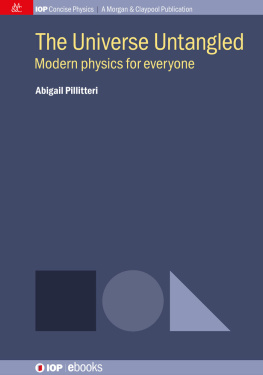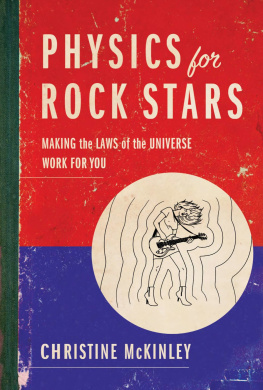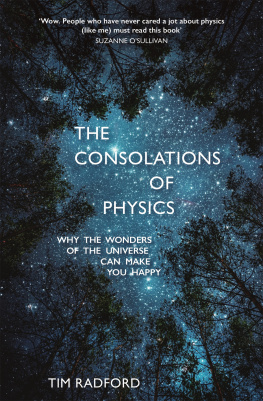Abigail Pillitteri - The Universe Untangled: Modern physics for everyone
Here you can read online Abigail Pillitteri - The Universe Untangled: Modern physics for everyone full text of the book (entire story) in english for free. Download pdf and epub, get meaning, cover and reviews about this ebook. year: 2017, publisher: Morgan & Claypool Publishers, genre: Children. Description of the work, (preface) as well as reviews are available. Best literature library LitArk.com created for fans of good reading and offers a wide selection of genres:
Romance novel
Science fiction
Adventure
Detective
Science
History
Home and family
Prose
Art
Politics
Computer
Non-fiction
Religion
Business
Children
Humor
Choose a favorite category and find really read worthwhile books. Enjoy immersion in the world of imagination, feel the emotions of the characters or learn something new for yourself, make an fascinating discovery.
- Book:The Universe Untangled: Modern physics for everyone
- Author:
- Publisher:Morgan & Claypool Publishers
- Genre:
- Year:2017
- Rating:5 / 5
- Favourites:Add to favourites
- Your mark:
- 100
- 1
- 2
- 3
- 4
- 5
The Universe Untangled: Modern physics for everyone: summary, description and annotation
We offer to read an annotation, description, summary or preface (depends on what the author of the book "The Universe Untangled: Modern physics for everyone" wrote himself). If you haven't found the necessary information about the book — write in the comments, we will try to find it.
The Universe Untangled: Modern physics for everyone — read online for free the complete book (whole text) full work
Below is the text of the book, divided by pages. System saving the place of the last page read, allows you to conveniently read the book "The Universe Untangled: Modern physics for everyone" online for free, without having to search again every time where you left off. Put a bookmark, and you can go to the page where you finished reading at any time.
Font size:
Interval:
Bookmark:

Modern physics for everyone
Abigail Pillitteri
Morgan & Claypool Publishers
Copyright 2017 Morgan & Claypool Publishers
All rights reserved. No part of this publication may be reproduced, stored in a retrieval system or transmitted in any form or by any means, electronic, mechanical, photocopying, recording or otherwise, without the prior permission of the publisher, or as expressly permitted by law or under terms agreed with the appropriate rights organization. Multiple copying is permitted in accordance with the terms of licences issued by the Copyright Licensing Agency, the Copyright Clearance Centre and other reproduction rights organisations.
Rights & Permissions
To obtain permission to re-use copyrighted material from Morgan & Claypool Publishers, please contact .
ISBN 978-1-6817-4513-8 (ebook)
ISBN 978-1-6817-4512-1 (print)
ISBN 978-1-6817-4515-2 (mobi)
DOI 10.1088/978-1-6817-4513-8
Version: 20170401
IOP Concise Physics
ISSN 2053-2571 (online)
ISSN 2054-7307 (print)
A Morgan & Claypool publication as part of IOP Concise Physics
Published by Morgan & Claypool Publishers, 40 Oak Drive, San Rafael, CA, 94903 USA
IOP Publishing, Temple Circus, Temple Way, Bristol BS1 6HG, UK
Dedicated to my parents.
Thank you both for everything.
This book aims to shed light on the fascinating nature of the universe. Well begin with a brief history of time and the fundamental forces and particles at play. Mind-bending concepts follow, including Einsteins theories of relativity, which describe how spacetime stretches and warps. After that, well dive into quantum physics, which covers the mysterious ways that particles and light behave. Finally, well explore black holes, dark matter, dark energy, and recent discoveries in science, including gravitational waves that ripple through spacetime.
The Universe Untangled is written for everyone. A professor may find it useful for a course such as General Science, Philosophy of Physics, Philosophy of Science, or Astronomy. A high school teacher might recommend it to curious students. And any popular science enthusiast is sure to be inspired by its contents. So welcome, and enjoy!
A warm thank you to: Professor Stephen Barr, for all of his time and effort through the editing process; Professors Barry Walker, Stuart Pittel, Harry Shipman, and John Clem for their help along the way; Brian Greene, for inspiring me to pursue physics; all of my professors at Boston College, especially Professor Graf for his time and patience; and my family and friends who have provided feedback and support. Thank you all!
Abigail Pillitteri

Abigail Lorraine Pillitteri has been proclaimed a modern day Renaissance woman. Now a supervising editor of educational science content, she has written for the U.S. Department of Energy and major publishers of next-generation educational products. Her contributions include the design and content production of educational games, digital mathematics lessons, professional development courses, and science worktexts. Independently, she has published three books of poetry, and she paints colorful conceptual artwork. Her free-verse poetry is rhythmic, emotionally raw, and honest, with occasional analogies to physics that connect the worlds of science and soul. Some of her paintings are also infused with scientific concepts, and her artwork has been displayed in events, galleries, and homes nationwide.
Abigail was born in small-town New Jersey to John and Gail Pillitteri, a home-remodeler and an artist/assistant teacher. She earned her Bachelor of Science in Physics & Philosophy at Boston College and a Master of Science in Physics at the University of Delaware. Her career path as a science writer and editor became clear during graduate school, where she was recognized for her keen writing abilities. Physicists Brian Greene and Neil deGrasse Tyson quickly became her figures of inspiration. She strives to make the miraculous concepts of physics accessible to all audiences, and to show the world how the realms of art and science are deeply connected.
If were going to start somewhere, we may as well start from the beginning. Lets rewind our clocks to what scientists believe is the earliest event in the history of our universe: the Big Bang. Well see if we can wrap our heads around the beginning of time, and then well walk through some of the major events that have occurred in outer space since then.
Most people have heard of the Big Bang since it is our best explanation for how the universe came to be the way we observe it to be today. The words Big Bang are a bit misleading, because this event took place microscopically and may not have produced any sound. Sound requires a medium, such as air, to travel through. But there was no medium around yet, so the event was probably silent. The name The Big Bang actually came from an opponent of the Big Bang theory, Fred Hoyle, but it nevertheless stuck [].
So what was the Big Bang? Imagine everything in the universe condensed into one tiny point of matter and energy. This miniscule, dense object not only contained the energy and atoms of everything that will ever exist, it also contained both space and time themselves. Scientists refer to this point as the Big Bang singularity. It is a stretch of the imagination to try to picture this all-encompassing object, because our minds want to place it in some region of space at some particular instant in time. But space and time were born from this singularity with everything else in the universe. We cannot define the location of the singularity, for there was no space yet in which to place it. We cannot speak of what happened before it came to be because there was no such thing as time yet. There was no concept of before. Time began at the Big Bang, the beginning.
For arguments sake, lets consider the possibility that the universe is infinitely old. If this were true, then an infinite number of events would have already occurred before we came into existence. Looking backward in time, we would see yesterday followed by the day before yesterday, and then the day before that, and then the day before that forever. That means, if the universe were infinitely old, the present moment could never come to be. An infinite number of events would have to happen before it, which is impossible. Well, clearly, the present moment has been reached, as you are reading these words right now. Since the string of events in history was able to reach the present moment, then there had to be a beginning of time. The Big Bang is what set our universe's clock ticking.
Keep in mind that Im talking about space and time in our universe. Perhaps something unknown to us existed, and from that unknownness, our universe sprouted. That very well may be the case, but we cant think of that unknownness in the same way that we think of space and time in our universe. Perhaps there was some other space and time outside of our space and time, or perhaps something very different from space and time existed and gave rise to the Big Bang. We really dont know. For our purposes here, well keep our discussion focused on space, time, matter, and energy in
Font size:
Interval:
Bookmark:
Similar books «The Universe Untangled: Modern physics for everyone»
Look at similar books to The Universe Untangled: Modern physics for everyone. We have selected literature similar in name and meaning in the hope of providing readers with more options to find new, interesting, not yet read works.
Discussion, reviews of the book The Universe Untangled: Modern physics for everyone and just readers' own opinions. Leave your comments, write what you think about the work, its meaning or the main characters. Specify what exactly you liked and what you didn't like, and why you think so.







